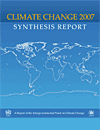One of our local treasures, Susan Solomon, gave a presentation last night to a standing-room-only crowd at the theater of the Boulder Public Library. Susan is a National Medal of Science winner, and she cochaired the UN Intergovernmental Panel on Climate Change (IPCC), which put together and published the 2007 report that won the Nobel Peace Prize.
I can’t imagine getting 100 people to agree on something, let alone more than 100 countries. Still, that’s what Susan and her committee did, and because of their hard work the IPCC report represents the most solid, broadest-based consensus about climate change ever put together. We use the IPCC report in our graduate classes to teach critical thinking and provide an example of trustworthy information. This pdf shows the extensive vetting that goes on in preparing an IPCC report.
In her talk Susan reviewed info and graphs from the climate change report. It was a sobering night: “Warming of the climate system is now unequivocal.”
Here are a few tweets I sent during the talk:
# Major challenge of #climate change is we have to think past our own backyards & past our own generation. -Susan Solomon
# If earth temp rises, even if we stop emitting CO2, temp will stay nearly same for close to 1000 yrs -Susan Solomon, #climate change
# Person in developed world emits 5x more CO2 than person in developing world. -Susan Solomon, #climate change
# Pine beetle infestations in BC & Rockies: due to longer summers, beetles get 2 breeding cycles. -Susan Solomon, IPCC #climate change
Did you know what a huge CO2 emitter flying across the country is? Thanks to Susan, I now know that in flying today from Denver to Phoenix to do my quarterly teaching gig at Prescott College, I emitted as much CO2 as the average Kenyan does in a whole year. This is the complexity of the problem: that the developed nations, 1/6 of the world, are emitting 5/6 of the CO2, and that the total emissions must go down at the same time that developing countries continue to industrialize.
Still, Susan thinks there is reason for hope. She cites the American public’s response to the news of the ozone hole over Antarctica in the seventies (a problem for which she was instrumental in identifying the cause: spray cans using CFC propellants). Three years before CFCs were regulated, American consumers by the millions turned away from buying spray cans with CFCs, such as personal care products like hair spray and underarm deodorant. True, for the problem we face now there is no simple solution, like buying a stick over a spray. There are, however, a lot of strategies that can act as wedges to help stabilize CO2 emissions.